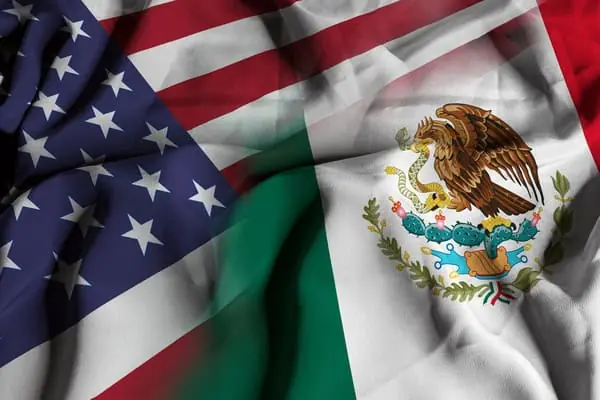
Navigating the Complexities of Mexico-U.S. Trade Relations
By Doing Business International | March 10, 2025
Trade between Mexico and the United States serves as a critical economic engine for both nations, reflecting an intricate relationship filled with immense opportunity and unique challenges. With bilateral trade exceeding $614 billion in recent years, businesses operating within this dynamic border face complex terrains of tariffs, regulations, and shifting policies. Understanding this relationship isn’t just an academic exercise—it’s essential for thriving in today’s interconnected global economy.
This article explores the key challenges of Mexico-U.S. trade, provides actionable recommendations for businesses, and underscores the economic and global impact of this indispensable trade relationship.
Key Challenges in Mexico-U.S. Trade Relations
While the U.S. and Mexico share a robust trading partnership, several pain points persist for businesses navigating cross-border channels:
1. Tariff Disputes and Policy Volatility
Shifting trade policies under various administrations often breed uncertainty. Tariffs on essential goods such as steel, automotive parts, and agricultural products create ripple effects for industries reliant on predictable supply chains. Businesses face challenges in long-term planning as they contend with this legislative unpredictability.
“Navigating the uncertainties of shifting trade policies with resilience and agility is vital for ensuring this foundational relationship remains robust,” says Dr. Ana Lopez, Trade Policy Expert.
2. Trade Balances and Deficits
The U.S. frequently raises concerns about its trade deficit with Mexico, emphasizing the need for a more balanced partnership. Addressing this imbalance requires a multifaceted strategy that explores tariffs while encouraging diversification of trade sectors and improved market access.
“Solving the trade deficit demands diplomacy and innovation—it’s not just about tariffs but expanding opportunities for balanced economic growth,” notes Prof. Carlos Rodriguez, Economist.
3. Complex Cross-Border Regulations
Customs procedures between Mexico and the U.S. are notoriously intricate. Varying regulations often lead to delays, added costs, and frustration for import/export businesses. Streamlining procedures could significantly reduce inefficiencies in trade operations.
“Better regulations will enhance the competitiveness of businesses on both sides by reducing wasted resources,” adds Maria Torres, International Trade Consultant.
4. Global Events Impacting Trade Strategies
The COVID-19 pandemic starkly highlighted the interconnectedness of both nations and the vulnerabilities in their respective supply chains. To ensure stability, both countries must invest in resilient trade strategies and adaptable logistics planning.
“Global turbulence reminds us of the need for collaborative supply chains that can withstand crises. This benefits both economies,” shares Javier Gomez, Economic Analyst.
5. Shifts in the Energy Sector
Mexico’s role as a significant oil producer introduces another layer of complexity to bilateral trade. Changes in energy markets or policy shifts directly influence trade dynamics. Businesses relying on energy products must remain adaptable.
“The energy sector is pivotal in shaping the delicate balance of trade relations. Stay ahead by anticipating and adapting to shifts,” advises Dr. Sofia Ramirez, Energy Economist.
Recommendations for Businesses
Success in navigating the intricacies of Mexico-U.S. trade lies in preparation and proactive strategies. Here are actionable steps businesses can take:
- Stay Updated on Policies
Stay informed about legal updates, negotiations, and trade agreements such as the United States-Mexico-Canada Agreement (USMCA). This ensures you’re not blindsided by changes.
- Diversify Trade Markets
Reducing reliance on a single trade relationship can mitigate risks. Look to expand into other countries to cushion the impact of policy volatility.
- Invest in Resilience
Build contingency plans for supply chain disruptions. Consider diversifying suppliers and inventory sources to maintain business continuity.
- Engage Experts
Work with trade policy consultants and legal advisors to help you fine-tune compliance strategies and streamline customs processes.
- Leverage Technology
Invest in digital tools that simplify customs compliance, improve logistics tracking, and generate trade data insights.
- Develop Industry Partnerships
Collaborate with suppliers, trade associations, and advocacy groups to push for policies that benefit your trade sector.
Let us help you optimize your processes, reduce risks, and achieve seamless global operations. Connect with DBi today and take the first step toward smarter compliance management.
Economic Impact
On Mexico and the U.S.
- Mexico is the U.S.’s second-largest trading partner, providing essential goods like automobiles, machinery, and produce.
- For Mexico, the U.S. serves as a key market and investor, accounting for over 40% of its foreign direct investment.
- Millions of U.S. jobs depend on exports to Mexico, from manufacturing to agricultural sectors.
On the Global Stage
- The Mexico-U.S. trade relationship sets a blueprint for other regional and international agreements.
- However, conflicts like trade disputes can trigger global uncertainties, emphasizing the importance of steady and balanced negotiations.
Case Studies of Trade Impacts
1. Navigating Tariff Battles
A U.S. automotive manufacturer faced steel tariff increases, raising production costs. By turning to diversified suppliers and lobbying for tariff exemptions, it regained stability.
2. Responding to Customs Delays
A Mexican agricultural exporter experienced spoilage due to prolonged inspections at U.S. borders. To counter this, they adopted new packaging technologies and alternate shipping schedules.
3. Adapting to Consumer Trends
A U.S.-based electronics retailer grappled with declining demand for tariffed Mexican goods. By promoting domestic alternatives and targeting price-sensitive consumers, it stabilized its market share.
Building Resilient Cross-Border Relationships
To foster smoother Mexico-U.S. trade, long-term solutions require collaboration from policymakers and businesses alike. Greater regulatory harmony, resilient supply chains, and balanced diplomacy will allow trade relationships to withstand global shocks.
At DBi , we specialize in helping businesses excel in international trade. Whether you’re navigating customs complexities, adapting to volatile policies, or seeking smarter supply chain strategies, our tailored solutions will give you an edge.
Reach out today for personalized guidance. Your next opportunity is just across the border.
Latest Articles
-
Exploring Brazil’s Potential as a Business Destination
March 10, 2025
-
Navigating the Complexities of Mexico-U.S. Trade Relations
March 10, 2025
-
Why Brazil Is a Strategic Choice for International Investors
March 9, 2025
-
Establishing a Business Presence in Mexico: Key Considerations for U.S. Companies
March 9, 2025
-
Navigating Corporate Taxation in Denmark – A Guide for Businesses
March 8, 2025